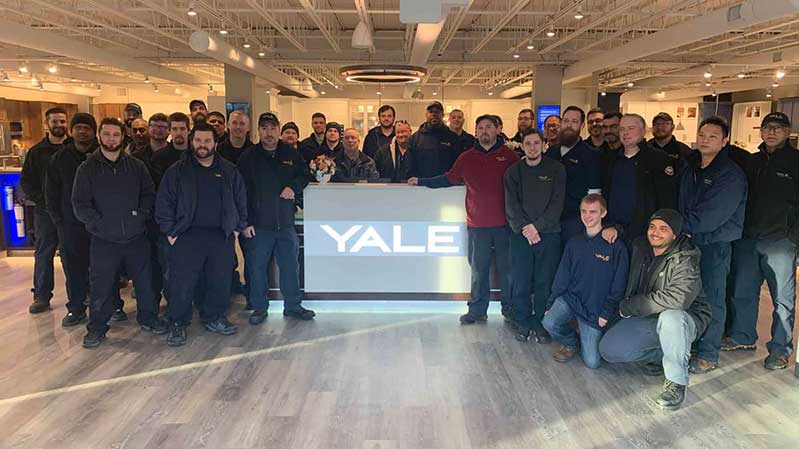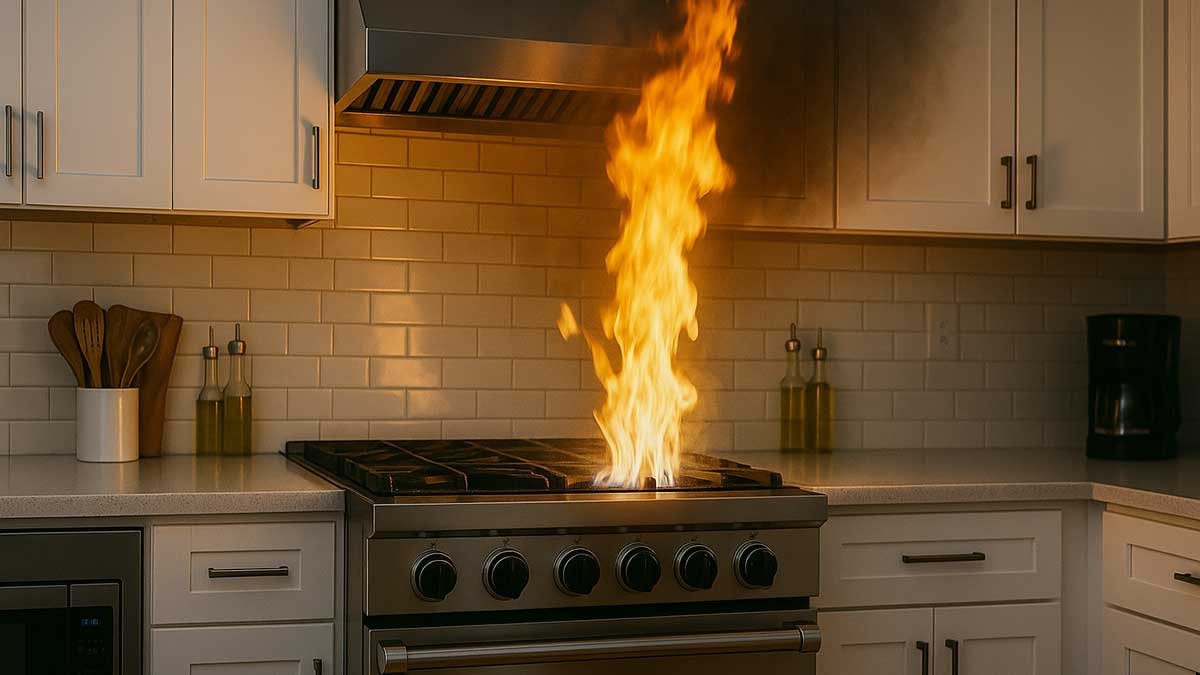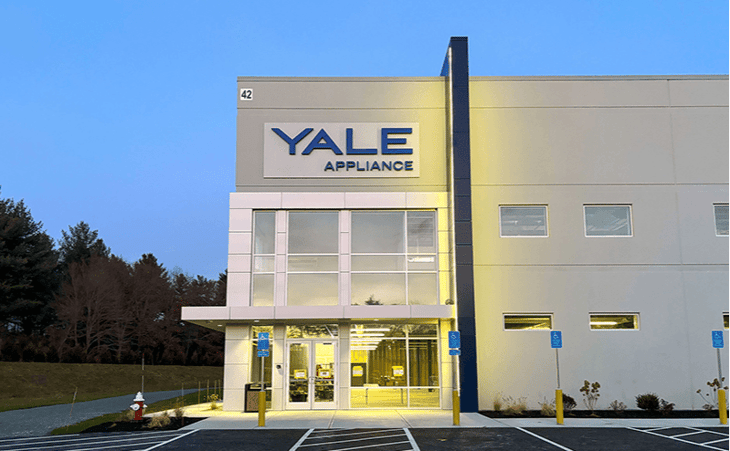Appliance Service 2026: Why Most Stores Skip It & How to Protect Yourself
November 5th, 2025 | 7 min. read

TL;DR: Appliance Service — Quick Answers
- Do you need service? Yes. ~9–15% fail in year one; bad installs can hit ~20%.
- Why most stores don’t service: Costly/complex; ~95% skip it.
- Will brands fix it? Often outsourced → uneven coverage, long waits.
- Protect yourself (before buying): Verify local coverage/parts; ask who services, average wait, who to call, where parts come from.
- Greater Boston service retailers: Yale • Poirier • Manny’s • Doyon’s • Crane • Toma.
- Why trust this guide: Based on 33,000+ Yale service calls/year.
The Holiday That Changed Everything
It’s Christmas Eve. The turkey’s prepped, the table’s set, and your guests are on the way. You press the button on your oven, and nothing happens.
You assume it’s a quick fix, but the service rep tells you the earliest appointment is two to four weeks away.
Dinner is ruined, and now you're scrambling.
That’s when it hits: service isn’t a luxury; it’s the most important part of owning an appliance. Yet nearly every retailer skips it.
In this guide, you’ll learn why 95% of appliance stores don’t offer service and how to avoid getting stuck the next time something breaks. Especially when it matters most.
📌 Skip Ahead:
- Do I actually need service? (failure rates & why)
- Why don’t stores service what they sell?
- Why don’t brands handle repairs?
- How do I protect myself before buying? (4 steps)
- Who services what in Greater Boston?
- Why Yale still does service (our approach)
- What should I do next? (checklist)
- FAQs
Why Do You Need Appliance Service?
⚡Quick Answer: Roughly 9–15% of appliances need repair in year one, and modern features make fixes more specialized—so the real question is who will show up and how fast.
Let’s be clear: every appliance will eventually need service.
Based on Yale Appliance’s data, about 1 in 10 appliances will need a repair in the first year. If your delivery or installation isn’t done right, failure rates can climb to 20% or more.
The issue is getting worse, not better.

Today’s appliances are packed with advanced features: twin compressors, induction modules, convection fans, steam cycles, Wi-Fi, and countless sensors.
These features improve performance, but they also make repairs far more complex.
Fixing a modern appliance often requires specialized training across electronics, refrigeration, gas, plumbing, and software.
So the real question isn’t if your appliance will need service; it’s who will be there when it does, and how long you’ll have to wait.
🔍 Read more: What To Do When Your Appliance Purchase Goes Horribly Wrong
Why Don’t Appliance Stores Offer Service?

⚡Quick Answer: It requires trained techs, parts, logistics, and support staff—and often runs at a loss—so many retailers focus on selling, not supporting, after the delivery.
If service is so essential, why don’t most stores offer it?
Because it’s the hardest part of the appliance business to get right, and the easiest to lose money on.
Selling is simple: stock the products, advertise, deliver.
But service is a different world. It requires:
- A full team of trained technicians on the road every day
- A stocked parts department to avoid weeks of delays
- Supervisors, trainers, and service managers to ensure quality
- Customer service reps handling thousands of calls and follow-ups
Even with all of that, service departments often run at a loss. At Yale Appliance, we budget over $1 million a year in losses because it’s the only way to support our customers properly.
Manufacturers cover just a fraction of the real cost to fix their products under warranty.
Most retailers know service is important but have abandoned it because it’s too difficult and expensive to maintain.
Online-only stores are even riskier.
Buy a refrigerator from a website based in New York and ship it to California, and that seller may not know a single service technician in your ZIP code.
You’re on your own when something breaks.
Today, 95% of appliance retailers don’t offer service—not because they don’t care, but because they can’t make it work.
Why Don’t Appliance Brands Offer Service?

⚡Quick Answer: True factory service is expensive to build and maintain at scale, so many brands outsource, leading to uneven coverage and long wait times.
Appliance brands used to offer reliable factory service. Decades ago, if something broke, you called Whirlpool, GE, or Maytag, and they sent a trained technician to your door.
Today, that kind of direct factory support is almost extinct.
Some brands are trying to rebuild it. Others rely entirely on third-party repair networks.
Why? Because running service at scale is incredibly expensive.
A nationwide network can cost $50 to $100 million upfront, with another $20 million per year to keep it running. That is a massive investment with no short-term payoff.
Instead, many brands rely on third-party repair companies or underfunded independents.
That leads to:
- Inconsistent coverage
- Long wait times
- Frustrated customers
Just look at online reviews. It is not always the product people hate; it is what happens when the product breaks and no one shows up.
How Do You Protect Yourself Before You Buy?
⚡Quick Answer: Use your pre-purchase leverage: verify local service coverage, confirm supported brands in your ZIP code, understand likely repair costs, and ask four critical questions at the point of sale.
You have the most leverage before you buy, not after. Once the sale is made, your options shrink.
Here’s how to protect yourself:
✅ Step 1: Research Local Service Before You Buy
- Call the manufacturer’s 1-800 number and ask, “How long would it take to get a repair in [your town]?”
- Check reviews for appliance service companies, and look for actual repair experiences, not just star ratings.
✅ Step 2: Know Which Brands Are Actually Supported
- Some brands invest in service, and others do not, but support varies by region. There is no universal “best.”
- What matters is support in your ZIP code.
✅ Step 3: Understand the Real Cost of Repairs
Repair costs and failure rates vary by category; plan for them before you purchase.
| Typical 1st-Year Failure Rate | Estimated Repair Cost (Out of Warranty) | Common Trouble Spots | |
| Built-in / Professional Refrigerators | 15% to 19% | $450 to $1,200 | Compressors, sealed systems, electronics |
| Ranges (Electric, Induction, Dual Fuel) | 7% to 12% | $350 to $900 | Heating elements, control boards, induction modules |
| Dishwashers | 9% to 11% | $200 to $600 | Pumps, leaks, sensors |
| Washers & Dryers (separate units) | 4% to 5% | $250 to $700 | Motors, drum components, sensors |
| Combo Washer-Dryers | ~9.5% | $200 to $700 | Moisture sensors, lint buildup |
| High-End Appliances (general) | 8% to 10% | $500 to $1,500 | Complex systems, premium parts |
✅ Step 4: Ask These 4 Questions Before You Buy
- Who services this brand in my area?
- What is the average wait time for repairs?
- Will I call the store for service, or a generic 800 number?
- Are parts stocked nearby, or shipped from across the country?
Ask these four questions before you buy to avoid long waits and surprise costs.
🔍Read more: How Much Does an Appliance Service Call Cost?
Why Does Yale Appliance Still Offer Service?
⚡Quick Answer: We learned that you can’t truly protect customers without controlling service—so we invest in people, training, parts, and rapid response even when it isn’t profit-driven.
If service is so difficult and so expensive, why does Yale still offer it?
Because we learned the hard way: you can’t protect your customers unless you control the service.
I’ll never forget August 10, 1993. A customer had an ignition issue with a brand-new professional range.
After weeks of trying to get someone out, I finally sent an independent technician.
A few hours later, the customer called, frantic. The range had caught fire.

The fire department broke through the kitchen windows with hoses and flooded the room to put out the flames. His brand-new kitchen was ruined.
That moment made something painfully clear: if we couldn’t handle service, we couldn’t stand behind what we sold.
Today, with so many of our clients building high-end kitchens or outfitting entire homes, waiting weeks for a repair isn’t an option.
So we built a service department, not because it’s profitable, but because it’s necessary.

We now handle more than 33,000 service calls per year in Massachusetts, with:
- 30+ full-time technicians
- 3 regional supervisors
- 2 dedicated trainers
- 2 full-time service managers
- A parts department with four staff
- 15+ customer care reps answering calls daily
We just look at service differently.
While other companies might spend on commercials saying how great they are, we’d rather spend that money fixing problems for real customers.
We’ve found that’s the kind of marketing that actually works.
Which Boston-Area Stores Still Service What They Sell?

⚡Quick Answer: In addition to Yale Appliance, Poirier, Manny’s, Doyon’s, Crane, and George Washington Toma continue to run local service departments.
Yale Appliance isn’t the only company that still believes in servicing what we sell, and that’s a good thing for homeowners in Massachusetts.
Here are other stores that continue to invest in local service:
- Poirier Appliance — Norwood
- Manny’s — Framingham & Worcester
- Doyon’s — Reading
- Crane Appliance — Falmouth
- George Washington Toma — Weymouth & Brockton
They’ve made the same choice: to build service departments that actually solve problems. And that deserves real credit.
Conclusion: How to Protect Yourself Before You Buy
⚡Quick Answer: Assume appliances will need service; verify who will fix them, how fast, and whether parts are nearby—do this before you purchase to avoid long waits and costly surprises.
Appliances break. It’s not a matter of if; it’s when. And when they do, the real question is: who is going to fix it, and how long will it take?
Before you buy, always:
- Research local service options. Who fixes what? How fast?
- Check coverage by brand. It changes by ZIP code.
- Imagine the worst-case scenario. Then see who is there to help.
If you can answer those questions before you buy, you’ll avoid a lot of frustration down the line.
FAQs
Answers to the most commonly asked questions about appliance repair.
🛠️ Do I really need service if I buy a high-end appliance?
Yes. Even the most premium products break. The difference is how quickly and reliably you can get help when they do.
🧑🔧 Can the manufacturer just send a technician?
Sometimes. Many brands outsource repairs or have limited local coverage. In many areas, manufacturer networks are thin, and wait times can stretch into weeks.
⏱️ Will an extended warranty guarantee faster service?
Not usually. Most extended warranties are handled by third-party firms with limited local techs. When something breaks, you may find yourself back at square one.
📍 Which stores near Boston actually service what they sell?
A few still do. Yale, Poirier, Manny’s, Doyon’s, Crane, and Toma all run real service departments. Most big-box stores—Home Depot, Lowe’s, Best Buy, and Costco—do not.
📞 How can I check if a brand is supported in my area?
Search “[Brand] appliance service” plus your town. Then call a few local companies and ask how long it typically takes to get a repair. If the wait is two to four weeks, that’s a red flag.
🚩 Ready to Get It Right the First Time?
If you’re planning a kitchen project, whether it’s a renovation, new construction, or replacing one appliance, the most important decision you make isn’t just what you buy.
It’s who is going to support you when something breaks.
We’ve seen it firsthand across 33,000+ service calls every year.
That’s why every appliance we sell is backed by real service, real installation teams, and real people who pick up the phone when you need help.
👉 Looking to buy soon?
Stop by one of our six Massachusetts showrooms and talk with an expert.
We’ll help you get your kitchen right the first time, and back it up with professional delivery, expert install, and full in-house service.
📍 Visit us in:
- Boston (Stoughton Street)
- Framingham
- Hanover
- Hyannis
- Norton
- Nantucket
Additional Resources
Before you buy, get the facts. Download the Appliance Buying Guide trusted by 1,000,000+ homeowners. Real reliability data from actual service calls.
Related Articles:
Why Should You Trust Us?
It seems that every appliance review has nothing but glowing comments about almost every product, yet you read customer reviews and they are almost universally bad.
We are here to fill in the disconnect. We'll give you the best features, and the drawbacks as well, including reliability based on over 37,000 calls performed by our service team just last year. Our goal is to give you ALL the information so you know what's right for you.
Please consider subscribing or adding to the conversation in the comments below. We appreciate you stopping by.
Steve Sheinkopf is the third-generation CEO of Yale Appliance and a lifelong Bostonian. He has over 38 years of experience in the appliance industry, and he is a trusted source of information for consumers on how to buy and repair appliances.
Steve has also been featured in numerous publications, including the
New York Times,
Consumer Reports,
The Boston Globe,
Bloomberg Radio, the
New York Post,
The Wall Street Journal, and
Entrepreneur, for his knowledge of how to buy appliances and appliance repair.
Steve is passionate about helping consumers find the best appliances for their needs, and he is always happy to answer questions and provide advice. He is a valuable resource for consumers who are looking for information on appliance buying, repair, and maintenance.
Despite being the worst goalie in history, Steve is a fan of the Bruins and college hockey, loves to read, and is a Peloton biker. The love of his life is his daughter, Sophie.
A Note About Pricing
Pricing on this blog is for reference only and may include time sensitive rebates. We make every attempt to provide accurate pricing at time of publishing. Please call the stores for most accurate price.



